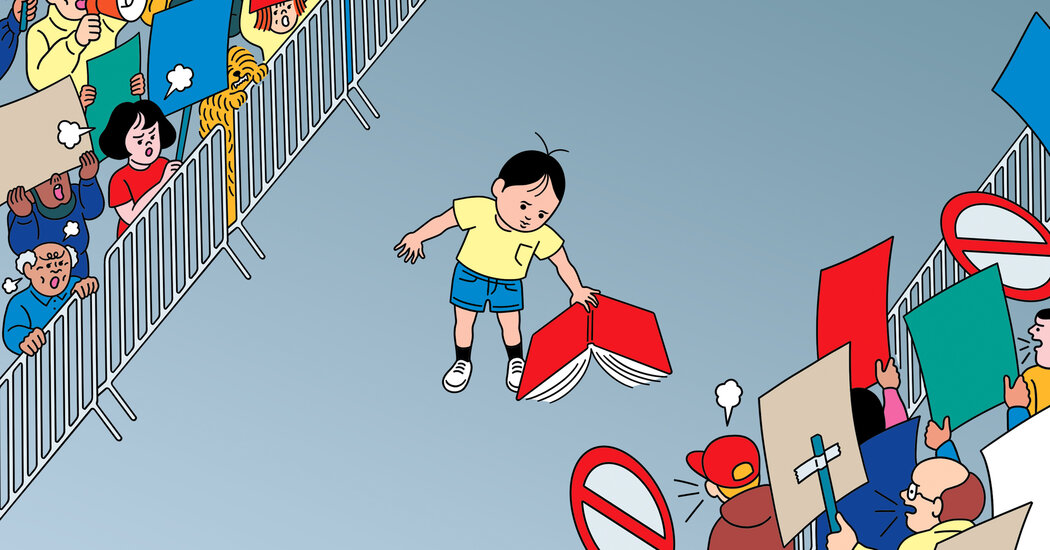On Tuesday the Supreme Court is scheduled to hear arguments over whether public elementary schools violate parents’ religious rights by compelling their children to be present in class when storybooks with L.G.B.T.Q. characters are read or discussed.
The hearing in the case, Mahmoud v. Taylor, comes after an era of furious protest and counterprotest, fiery school board meetings and mutual accusations of bigotry in our schools in Montgomery County, Md.
The case is freighted with important questions about religious freedom, L.G.B.T.Q. and parental rights and the role of public schools. Still, as a parent in the school system now under examination, I deeply resent the whole mess.
I begrudge the public money wasted on expensive lawyers. I can’t fathom that we squandered so much energy fighting over storybooks even as our kids’ test scores floundered, absenteeism soared and student mental health slumped in the wake of the pandemic.
I can’t decide which conceit is more delusional: The school district grandstanding about social tolerance while forcing a minority of religious families to engage with books they consider immoral or the religious parents claiming that they can’t properly rear their children in faith if the kids get exposed to a few picture books. Both positions, it seems to me, rest on a cartoonishly inflated sense of school’s influence on children. And both seek an ideologically purified classroom while underestimating the sweep of ideas and information kids absorb simply by existing in our world.
Most of all, I feel that our community’s failure to resolve a thoroughly predictable tension with the time-tested tools of straight talk, compromise and extending one another a little grace has made for a demoralizing spectacle. And I can’t help but notice that our district, in its clumsy efforts to force tolerance, might have given the Supreme Court an opening to repress L.G.B.T.Q.-related speech in the nation’s schools.
There wasn’t much fanfare or outcry when, just as a school year began in 2022, the district added a handful of L.G.B.T.Q.-inclusive storybooks to the elementary English curriculum. For example, “Pride Puppy!,” an alphabet book in which a pet dog gets lost at a Pride celebration, includes a search-and-find list for incipient readers with words like “leather,” “[drag] queen” and “intersex.” In the fairy tale “Prince & Knight,” a handsome prince rejects a parade of princesses before realizing that he would rather marry a knight. “Born Ready: The True Story of a Boy Named Penelope” was written by the mother of a trans boy.
Many of us were oblivious to the whole thing and — in my case, anyway — wouldn’t have complained about the books even if we’d known. Some parents who paid closer attention could and did opt out, but that didn’t draw much attention, either.
That’s probably because there is nothing very remarkable about the subtle but widespread use of opting out in American schooling. Our district (in accordance with state law, like most in the United States) has long allowed parents to opt their children out of health classes about sex and what the county calls “family life.” Even the most liberal U.S. enclaves (San Francisco; Portland, Ore.; Boston; Minneapolis) let parents excuse their kids from sex education. Giving parents the chance to opt out has, in fact, prevailed as the more open-minded approach; some states (Utah, Nevada, North Carolina) require parents to opt kids in before they are taught about sex.
But a few months after introducing the books at the county’s elementary schools, the district announced, for reasons that remain unclear, that families would no longer be allowed to opt out when the books were taught. In its legal filings, the district explained that there were simply too many parents trying to opt out, causing complicated logistics, driving absenteeism, and creating a risk of “exposing students who believe the storybooks represent them and their families to social stigma and isolation.”
Hisham Garti, who met with district officials as a Muslim community representative, said he was told that the decision to end opt-outs came about after L.G.B.T.Q. families reported that their children’s feelings were hurt when their classmates left the room to avoid the books. He told me that he was sympathetic to the students but that religious pupils had also suffered stigma. Some of them, he said, were shamed over their families’ request to opt out.
Whatever the reason, once the opt-out was gone, everything heated up. A diverse group of parents — including Muslims, Ethiopian Orthodox Christians, Jews and Catholics — demanded the opt-out’s restoration. They railed at school board meetings. They held street protests. Their numbers grew. Meanwhile, the district refused to budge.
“It was extremely poorly handled by one of the biggest school districts in the U.S.,” Mr. Garti told me recently. “They allowed it to be politicized. I feel like, in the end, they knew they were wrong. But they wouldn’t back down.”
It didn’t have to go this way. The district could have added the books, maintained the right to opt kids out and gotten on with running our many schools. In that alternative universe, most of the students get to hear the stories, religious parents are mollified, and the Supreme Court doesn’t have yet another case that could make life worse for L.G.B.T.Q. families across the land. Because make no mistake: Opting out is the real sticking point. There is a persistent misapprehension that this case is about book banning. But these parents haven’t sought to ban the books or tried to stop teachers from reading them aloud. They have fought energetically for the right to exempt their own kids from the instruction.
I first heard about the books in the spring of 2023, when a mother I knew through kids’ sports asked if I was also bothered. (I wasn’t.) She wasn’t thrilled about the books, she said, but mostly she didn’t like the way they’d been brought into the classroom. The school was inserting itself between her and her children, she said, and imposing a view. She was not religious. But after fleeing Iran with her family as a child, she retained a revulsion at anything that reminded her of the ways power worked in Iran. I remember listening to her, not quite getting it, unable to follow the line between the events she described and her reactions to them.
It strikes me that many of the protesters are immigrants with similar feelings — an indignation at the suggestion of their rights being infringed by the very country that was supposed to be their escape from repression. Peel away the Trump-tinged distractions of Moms for Liberty (which joined in the protests) and supporting briefs from the political organizations of Mike Pence and Stephen Miller, and there remains a substantial group of local families who believe their rights were violated.
“The opt-out option was a fair approach,” a father named Wael Elkoshairi told the board during a contentious 2023 meeting. “Listen, I realize that my religion and my beliefs are not mainstream and that we’re a minority in this country. However, I stand by my God-given right and constitutional right to practice, promote and raise my children on those beliefs.”
The opt-out is the kind of accommodation that keeps our public schools thrumming along, a social force at once ephemeral and fundamental.
Montgomery County sprawls from crowded urban enclaves pressed against the northern edge of Washington, D.C., to sleepy farmlands out toward the Pennsylvania border, with a whole lot of suburbia in between. With about 160,000 students, the district is among the nation’s largest. It’s also one of the most ethnically and religiously diverse. My family moved to these suburbs specifically because we wanted to enroll our kids here, lured by the promise of Chinese immersion in the public schools.
The longer we’ve lived here, the more I’ve noticed how the area’s cosmopolitan bonhomie is facilitated by small, easily overlooked accommodations woven carefully through the system. Religious holidays, for example, are not listed on our secular-by-decree school calendar. Still, the district carefully avoids holding classes on Rosh Hashana, Eid al-Adha or Eid al-Fitr by scheduling teacher workdays or some such.
I’ve listened to hours of public testimony at school board meetings. Over and over, I heard pleas for mutual respect: We get why these books matter, and we want to support the L.G.B.T.Q. community, many of the parents said, but we’d also like to be respected and accommodated. Keep the books; read the books; just send our kids out of the class.
The district did not answer questions I sent it for this article. (In October it was reported that two of the controversial books had been removed from the curriculum, but the decision was not publicly explained.) In a brief filed in the case, the school board argued that the district had no legal obligation to offer an opt-out, because the storybooks were part of the English curriculum, not health. That’s technically true: The Maryland law specifies that the opt-out is for sex education in health classes.
The district also argued in court that the books told “archetypal stories that touch on the same themes introduced to children in such classic books as ‘Snow White,’ ‘Cinderella’ and ‘Peter Pan.’” The characters happened to be L.G.B.T.Q., the argument went, but their sexuality and gender identity were not the point of the book. School board members have also made this argument.
I don’t believe it’s true — and I say that as someone who’d like to keep the books around. Some of the books in question are stories specifically about the revelation of gender identity or sexual orientation. It’s disingenuous to pretend that a roomful of very young readers won’t end up grappling with the very topics of sexuality that parents can opt out of in health class.
The elementary school principals didn’t buy it, either. After reviewing the books, the association of unionized principals sent an alarmed letter to top Montgomery County Public School district officials. It reminded them that the county had described the books as promoting inclusivity by showcasing L.G.B.T.Q. characters.
“It has been communicated that M.C.P.S. is not teaching about sexual orientation and gender identity as stand-alone concepts in elementary school,” the letter said. “However, several of the books and supporting documents seem to contradict this message.”
The principals warned that the books might not be appropriate for primary school, that the teachers didn’t have proper training to present them and that some parents were concerned about hidden agendas and indoctrination. The letter noted that principals were facing parents who “vehemently” wanted the books kept from their children, as well as parent groups with “strong support” for the books. In short, decisions about the books could “significantly damage school-community relationships.”
Nevertheless, after listening to a student tell the school board the topics were “unsettling” because they contradicted her religious beliefs, a board member, Lynne Harris, told a reporter she felt “kind of sorry” for the girl and speculated that she may be “parroting dogma.” Other times Ms. Harris, who was not re-elected last fall, accused the parents of “hate” and ascribed to them “a judgmental view and a belief that not everybody is OK.” (Ms. Harris didn’t reply when I emailed her for comment.)
Another politician who angered the religious parents was a County Council member, Kristin Mink, who said the picture book controversy had put “some Muslim families on the same side of an issue as white supremacists and outright bigots.”
Ms. Mink’s words echoed among the outraged parents, were documented in their legal filings and were invoked as a reminder of nasty smears. It’s too bad, though, because her full statement had a nuance that was lost when it was trimmed to the line about bigots and racists. She started by saying she’d been having good conversations with the protesting parents.
“It’s more complicated than, I think, than a lot of people would like to — than a lot of people would like to think it is,” Ms. Mink said, faltering. She allowed that the parents — “not all, of course, but some” — had taken the side of the bigots. “However,” she added quickly, “the folks I talked to today, I would not put them in the same category as those folks.” She said that many of the protesting parents sincerely wanted the books to remain in the schools and that they wished “to not do harm to members of the L.G.B.T.Q.I.A.+ community.”
Ms. Mink then articulated what is, I think, the county’s cleanest, strongest defense of the books: L.G.B.T.Q. people exist.
“M.C.P.S. has the responsibility to include and reflect that reality in our curriculum the same way we have a responsibility to teach about evolution,” Ms. Mink said. “There are religions that don’t believe in evolution, and we don’t allow them to opt out of those portions of our science curriculum.”
This is where I, too, feel cold toward the parents’ complaints. Texas educators have pushed to conceal the historical truths about slavery in children’s history texts, proposing to call the slave trade “involuntary relocation.” (In 2015 a Texas textbook was revealed to have referred to slaves as “workers.”) I’ve wondered how different these revisionists are from the Montgomery County parents demanding their primary school children be shielded from stories about gay couples and trans kids. Both, at heart, demand the schools filter out objective truths. After all, gay and trans kids, families and teachers don’t just exist; they exist within the halls of the schools. Why shouldn’t they appear in the books?
The only available answer is that — for whatever religious reason or instinctive impulse — society has walled off questions of sex and sexuality and left them, largely, in the hands of parents.
But there’s another way to think about the ineffaceable existence of L.G.B.T.Q. people: It underscores the futility of this entire debate over opting out.
Because here’s the secret about opting out: It doesn’t really matter. As a kid in Connecticut during the tail end of the AIDS epidemic, I was opted out of AIDS education. My parents were observant Catholics who taught their children about sex but also told us to wait until we were married. My mother phoned the school and announced that she didn’t want her daughter to participate in AIDS prevention classes. The school agreed, and I was herded elsewhere while everyone else, presumably, learned about condoms.
My mother did not have a good case, given the severity of the public health crisis.
But the school accommodated her, and it didn’t matter. I already knew about condoms. I already had the knowledge my mother was trying to stave off.
I knew because the world existed around me, unfiltered by adults. I had countless sources of information, almost all of which I (being a teenager) considered more reliable than my parents or teachers. The internet wasn’t even a part of our lives yet, but I had friends, I dated boys, and I spent time at the homes of kids whose parents were far more libertine than mine. I watched TV, I saw billboards, I read books that were packed with sex, I heard conversations, and I thumbed with interest through the Playboys one friend kept stuffed under his bed.
My mother had a preference. The school accommodated her. In the words Mel Robbins has launched into our self-help zeitgeist, the school let her.
Here in Montgomery County, everyone went to war, and nobody has moved on. Either the school district or the religious parents will prevail at the Supreme Court. And one group of families — either the pious or the L.G.B.T.Q. — will feel the judgment as a disenfranchisement and a sign that people like them are not wanted at school. And that’s a shame because, agree with them or not, they all stood up for their values.
Whatever the justices think, it’s already too late for our community to win.
The Times is committed to publishing a diversity of letters to the editor. We’d like to hear what you think about this or any of our articles. Here are some tips. And here’s our email: [email protected].
Follow the New York Times Opinion section on Facebook, Instagram, TikTok, Bluesky, WhatsApp and Threads.
Megan K. Stack is a contributing Opinion writer. She has been a correspondent in China, Russia, Egypt, Israel, Afghanistan and the U.S.-Mexico border area. Her first book, a narrative account of the post-Sept. 11 wars, was a finalist for the National Book Award in nonfiction. @Megankstack
The post My School District Could Have Avoided This Supreme Court Case appeared first on New York Times.




